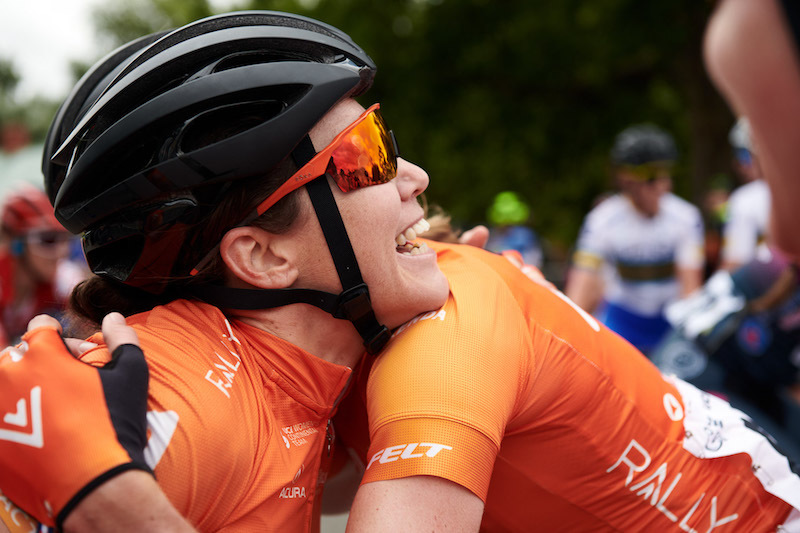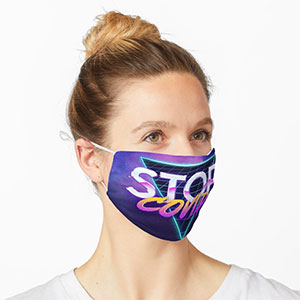Last May, standing on a platform in Harrowgate, England, watching the train she was meant to be on leave the station, pro cyclist Chloe Hosking sobbed. Coming off one of the worst racing periods of her career, she was feeling deflated. Nothing had been going right. Her husband and family were half a world away in her home country, Australia. She was lonely. Homesick. Missing the train was the last straw.
Hosking whipped out her phone and tapped out a desperate text. “I miss you guys,” she wrote to her older sister, tears splashing down on the phone. “I’m tired. I’m sad. It’s not worth it.”
Hosking, 29, wasn’t used to wallowing. Throughout a decorated 11-year career, she’d thrived under pressure, collecting 35 professional wins, 100 podium finishes, and appearing in every major women’s cycling competition, from the Olympics and the World Championships to the Commonwealth Games. In 2016, she bested a field of 121 racers to win the esteemed La Course, the women’s one-day race on the legendary Tour de France route. No course or competitor had ever spooked her. The fiercer the challenge, the better.
But in early 2019, while racing for the Italian squad Alé Cipollini on the brutally competitive European circuit, Hosking finished nearly last — or not at all — in three major races. She pulled in toward the back in the Dwars door Vlaanderen, in Belgium, and dropped out of the Liège-Bastogne-Liège Femmes and the Amstel Gold Race Ladies Edition.
As Hosking’s results suffered, so did she. In her time with Alé Cipollini, she’d picked up only a handful of basic Italian phrases. Stymied by her inability to express herself to her coach and teammates, she felt trapped and isolated, uncertain about her future.
For a few painful months, Hosking wondered whether it might be time to call it quits. Until a phone call in August 2019 came from Zach Bell, team director for Rally CyclingSM: Would she like to mentor the women’s squad?
Hosking talked about it with her family, and said yes. Already, the change has made a difference. It’s freeing, Hosking says, to come into 2020 with “less focus on winning and more focus on being a good team leader.”

Not that winning isn’t on the agenda. She started the year with a bang, clinching Australia’s Criterium National Championships for Rally on her home turf, another stage win at the Santos Women’s Tour Down Under, and a sixth place finish in the Cadel Evans Great Ocean Road Race. In a couple of months, Hosking will compete for a spot on Australia’s 2020 Olympic cycling squad.
Sometimes the journey feels like a dream.
“When I was coming up in Europe at 18, I had no idea that I would end up in this position,” she says. “I feel really lucky.”
Now she’s hoping to share that luck with her teammates.
A star is born
If not for shin splints, Hosking might never have found herself mentoring a professional cycling squad.
Hosking was 12 when the injury forced her off the field hockey field. Itching to find ways to move while she waited for her legs to heal, she asked her dad, Steve, a casual racer, to take her out on a ride.
“I think he had been waiting for that moment,” she says. Her father was ecstatic, including her on group rides with his home club, Canberra Cycling. He taught her sprint tactics, testing her skill by challenging her to race. If she could beat him, he told her, he would pay her $20. “He never once let me win,” Hosking says. “I had to earn it.”
In Australia, women bound for the pros typically get into cycling in their early teens. Hosking arrived right on schedule, with the advantage of being a natural athlete.
She started racing almost immediately, thriving in the local Canberra racing scene, taking home her first major junior win at Australian Track Nationals in 2008. The following year, she moved from the track to road racing, winning the Tour of Chongming Island.
In 2010, she clinched the bronze medal in the Commonwealth Games — following a sprint against none other than Joanne Kiesanowski, now director of the Rally Cycling women’s squad. “She was young, but had such a powerful sprint,” Kiesanowski remembers, “and a great energy.”
At 19, Hosking went pro, joining Team HTC–Columbia Women, then Team Hitec Products and Wiggle–Honda. In 2016, she caught the world’s attention with her stunning victory at La Course. A year later, she joined Alé Cipollini.
Initially, Hosking performed well. She took home stage wins in the Santos Women’s Tour, the OVO Energy Women’s Tour, and the Ladies Tour of Norway. In 2018, she topped the field in the Commonwealth Games Road Race, one of her biggest wins yet.
But early in the 2019 season, Hosking hit a plateau. Not being able to speak fluent Italian was becoming increasingly frustrating. People who aren’t cyclists may assume that riding is a quiet, solo endeavor. But behind the scenes, communication is crucial. In many races, riders are in constant contact with team directors and mechanics via radio. Mid-race, subtly communicating with teammates with a quick glance or a flick of an elbow can mean the difference between a team win or a loss. A rider’s communication with her coach can make or break her season.
Despite three seasons with Alé Cipollini, Hosking hadn’t managed to pick up enough Italian to eke out more than a few phrases. She’d be in new cities with teammates, unable to enjoy the sights or conversation-filled meals, embarrassed as she struggled for words. She liked her teammates, but something vital was missing. In competitions, she began to falter. “I thought I had a lot to bring to a team,” she says. “But so much was getting lost in translation.”
In a rut
Before long, Hosking’s communication problems started to affect her race results. For the first time in her career, she was turning in less than stellar performances.
She took it hard. “In a high-pressure environment, when you’re not delivering, it’s easy to be your own worst critic,” she says. “When you’re winning you are the flavor of the month, but that can change just as quickly.”
As her season continued its downward spiral, Hosking’s coach finally told her to go home and reset. In Australia, surrounded by her support network — her husband of a year Jack Lindsay, 29, a product manager; her sister, and parents — Hosking started to feel more like herself again.
“The first step to coming back was just getting in touch with those people and saying that I wasn’t doing well and needed help. It took me reaching out to my coach, explaining how I was feeling, and returning home for a few weeks to reboot,” Hosking says. She went back to basics: riding her favorite routes, and sometimes swapping the bike for her stand-up paddleboard to mix things up.
By midsummer, Hosking was back to racing with Alé Cipollini. She wrapped the season with four wins, two podiums, and a trip to World Championships.
Still, privately, she wondered whether it might be time to move on. A voice in her head kept asking if all the effort she was putting in was worth it. Spending time with her dad — the person who’d inspired her love of the sport in the first place — brought clarity. In October, the pair took a six-day bikepacking trip through China. Pedaling through the Karst Mountains, stopping for snacks and the occasional beer along the way, helped Hosking fall back in love with cycling. “It was the best kind of amateur bikepacking, just plain fun,” Hosking says. “Exactly what I needed.”
Indeed, it was. Days after she finished her trip with her father, she raced the Tour of Guangxi, her last competition with Alé Cipollini — and won.
Becoming a mentor
After last season, Hosking decided she was nowhere near ready to retire. When Bell approached her late last summer about potentially joining Rally as a team mentor, Hosking liked the sound of the idea. By October, she was on the roster.
Kiesanowski has high hopes for her old opponent. “Chloe is a strong leader,” she says. “She can be the one who wins the race, or lay it on the line for a teammate to take that win.”
Hosking is looking forward to sharing the spotlight. “I want to perform well, but on-road leadership is what I can really offer, especially for the upcoming young American talent,” she says, then adds with a laugh: “And the Rally Cycling girls will get more out of me since they’ll understand what I’m saying!”
There’s also the wisdom she’s gleaned from spending years living and racing abroad. On the road, racers often live a Groundhog Day-like existence: Wake up in an unfamiliar hotel room. Put on jersey and shorts, tighten shoes, buckle helmet. Eat breakfast in the team van en route to the start line. Race. Climb back in the van, go to the next hotel. Dinner, stretch, sleep. Repeat for weeks at a time.
Hosking knows the routine inside and out. She can counsel young riders on how to pack, cope with jet lag, and find healthy meals in any country. She can also coach them through every twist and turn on the European race routes.
But the most important advice she hopes to impart has nothing to do with race tactics or life on the road. It’s about living in the moment — and being thankful.
Racing is “such an all-consuming bubble if you let it be,” Hosking says. “If you have a bad result, it’s easy to let that eat away at you.
“You can get so caught up in being an elite athlete, thinking you have to do everything perfectly. But you also need to be able to take a step back and think, ‘Wow, this opportunity is amazing. I’m in Belgium, or France, or Italy, eating amazing food, seeing amazing things.’ Taking those moments to appreciate it and soak it in are so important.”
And so is remembering that life is about more than cycling. For Hosking, that means pursuing other athletic passions — mountain biking, kayaking, stand-up paddle boarding, and yoga — as well as spending time with her husband, grabbing a glass of wine with her girlfriends, or working on coursework toward her law degree, which she hopes to use one day, after her racing career is over, in the field of athlete management.
What she really wants her teammates to know, says Hosking, is that you’re never alone. Even when you think you are, help is never far away. You just have to have the courage to ask for it.
“That’s the hardest skill to have,” Hosking says. “Whether that means staying in communication with family, friends, team, coaches, sport psychologists. Whoever gets you through the tough days and helps you with the bad ones.
“I know I’ll get into a rough moment at some point in the future and have to relearn everything,” Hosking says.
“But now I have the resources to help myself. And hopefully the other girls, too.”

